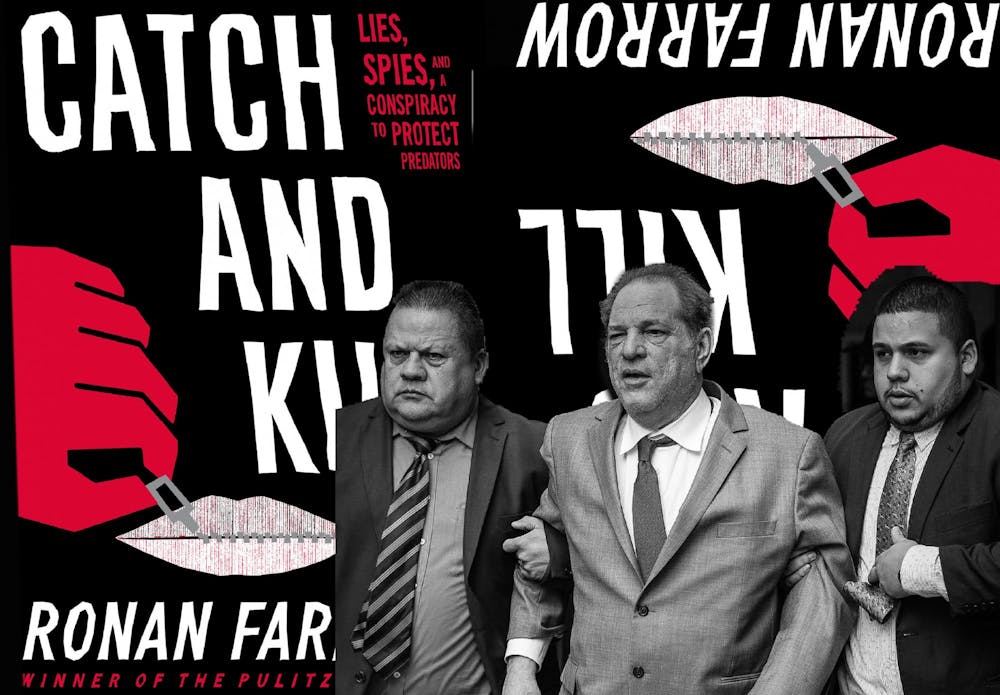As a seven–year–old, Dylan Farrow was recorded telling the story of how her father, renowned American filmmaker Woody Allen, sexually assaulted her. She was speaking to her mother, award–winning actress Mia Farrow, who made a videotape of the conversation that would later be used in legal battles and most recently in a new HBO documentary: Allen v. Farrow.
Allen v. Farrow is a four–part series that explores the horrifying complexities of Woody Allen and Mia Farrow’s relationship, including the sexual assault allegations made by Dylan against her father, as well as Allen’s relationship with Farrow’s adopted daughter, Soon–Yi Previn. The docuseries is well–made, if at times one–sided. It places a spotlight on a 30–year–old Hollywood controversy between Allen and Farrow but asks viewers to watch a story that goes further than just a celebrity scandal. Rather, it is a harrowing tale about the trauma and aftermath of child sexual assault, as well as abuse of power. Even more so, it forces us to reflect on the many shortcomings of how our society responds to these experiences.
When systems of justice and institutions of accountability fail those they seek to protect, as they often do in cases of sexual assault, the nature of the fight changes. Rather than navigating the intricacies of the situation through an objective and organized process, the battlefield moves from courtrooms and lawyers’ offices to the arena of public opinion. The issue then falls upon society to address and correct.
One of the conduits for society to address and correct issues such as these comes in the form of film and television. Every few months, not unlike Allen v. Farrow, a new documentary comes out profiling a powerful man once again falling to his demise as the result of his own behavior. Daunting music and haunting survivor testimonies fill the screen while audiences wince and denounce the perpetrator.
How could this have been allowed to happen? Why didn’t someone do something?
We ask ourselves these questions, seeking answers that could bring us a sense of understanding and if we’re being optimistic, some solace. Oftentimes, the answers we find are incomplete and bridled with disappointment.
Somewhere in each of these exposés and docuseries lies a painful realization: continued abuses of power and patterns of toxic masculinity start with the abuser, but they are sustained by seemingly harmless individual players in our society. The questions then evolve to why are men in positions of power prone to patterns of sexual assault? And once they commit them, why are they so difficult to prosecute socially, professionally, and legally? To understand what enabled Woody Allen to continue to thrive despite allegations of molestation, and his pattern of preying on young women (including his relationship with Mia Farrow’s adopted daughter, Soon–Yi Previn), it might be helpful to look to the fall of Harvey Weinstein.
In 2017, Ronan Farrow, Dylan’s younger brother and only biological child of Allen and Farrow, wrote a piece for The New Yorker on the Harvey Weinstein scandal, an act which contributed to the popularization of the #MeToo movement.
Harvey Weinstein’s predatory behavior had persevered for more than 30 years, widely accepted in the industry for what it was. The secret was poorly kept, but the protection of Weinstein was well–maintained. Weinstein seemed impenetrable against his accusations, even employing international spy agencies to gain intelligence on his accusers. An elaborate infrastructure was built to prevent him from having to face the legal and social implications of his behavior until the film mogul was exposed in a Pulitzer Prize–winning series of exposés published by The New York Times and just a few days later by the New Yorker. Despite years of clear and damning evidence, it took extensive investigative reporting and considerable resources to assemble the case that would take down Weinstein. Though scandalous and shocking, the Weinstein scandal is not an isolated incident so much as it is a microcosm of a much larger crisis.
Harvey Weinstein and Woody Allen are powerful men whose ill intentions and abusive behaviors were strategically tucked away under their awards and accolades. The delayed response in holding them accountable for their behaviors is troubling, but ultimately preventable.
According to psychologist Dachner Kelner, men in these positions of power act this way because the experience of having power is associated with a decline in empathetic ability as well as an increase in feelings of entitlement. These changes escalate a person’s likeliness of engaging in risky activity and commit unethical, impulsive acts, especially when set in a male-dominated environment. The social–psychological underpinnings of these stories can be understood and explained by evidence-based research and analysis, therefore our society has the tools and knowledge needed to develop systems that refuse to allow these abuses to continue. It is becoming increasingly clear that it is not enough to believe survivors of sexual assault. If we want to say we stand by survivors of sexual assault, then our stance must be attentive to the complex nature of the crisis and proactive in our strategy to reduce the resulting harm.
Our willingness to turn a blind eye when the perpetrator is someone whose work is valued by society is a slippery slope to complicity. For years, Dylan Farrow has voiced that society’s insistence on celebrating her father has led to her feeling silenced. Her decision to share her story with the public and release the video of herself at seven–years old is a courageous one. In doing so she is actively working to reduce the shame and stigma experienced by survivors of sexual assault. However, it should not take the sensationalization of a survivor’s trauma to convince society to stand by them. If preventing abuses of power and improving social and legal responses to sexual assault are matters of systemic change, then the change must begin by everyday actors within all systems.

